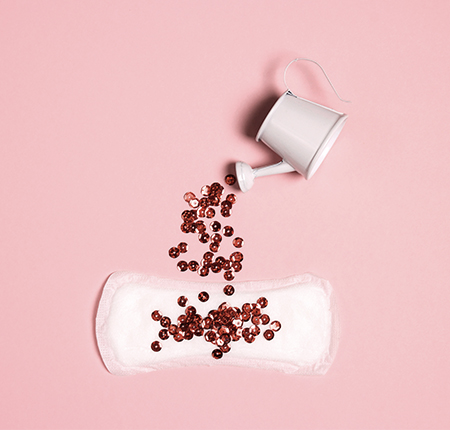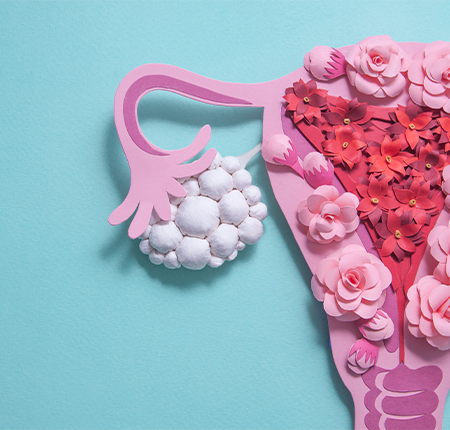
Brown Vaginal Discharge - What does it mean and why does it happen?
You're not on your period, but you see that your underwear is a little discolored. It's blood, vaginal discharge, wondering if you have a problem or something normal? It's the moment of truth.
Vaginal discharge is a normal, healthy process useful for removing cellular and bacterial debris. In addition, they usually have an acidic pH that prevents bacterial multiplication, which means, loosely translated to us, the risk of developing vaginal infections is much lower! Yay!
You know a vaginal discharge is normal when:
it is transparent or whitish
it does not have a strong smell
is not accompanied by irritation or pruritus (itching)
Throughout the menstrual cycle, vaginal discharge can vary and changes in color, smell, viscosity can be observed. Sometimes they can indicate problems that our body is dealing with, while other times they can be a very common phenomenon. So what does the color brown tell us?
What does it mean when you have brown vaginal discharge?
Brown discharge is similar to normal discharge, with one difference: blood has been mixed into the vaginal fluid. There are many causes that can influence the color of vaginal discharge, and before you panic, read here about each color and what it means to you.
Brown secretions depending on the menstrual cycle - What is normal?
Brown discharge is normal during menstruation or when the blood is exposed to air and undergoes an oxidation process, turning from red to brown.

Brown discharge before menstruation
Before menstruation, a brown discharge can be caused by the fact that the bleeding comes in a very small amount and is not a cause for concern. If you want absolute protection, comfort and safety on slightly redder days, organic absorbent pads are your number 1 ally. Inspired by your body, created with care and with 100% natural ingredients, Enroush absorbent pads are hypoallergenic and gynecologically approved. You deserve intimate care products that have nothing to hide!
Brown discharge after menstruation
At the end of menstruation, the brownish color of the vaginal discharge is simply due to the blood that was eliminated later. In most of the cases, they last about 2 days and can vary both in terms of consistency and color intensity. For moments like these, when you're taken by surprise, choose 100% natural protection, such as Enroush daily absorbent pads made from GOTS certified organic cotton. You have peace every day, and your intimate area no longer comes into contact with chemicals, plastic or perfumes that cause allergies and irritations. You can order them right here.
Brown discharge and lack of menstruation
Perimenopause is a natural process of transition to menopause. Symptoms appear months, or even years, before menstruation stops. During this period, there are changes in the consistency, color and texture of vaginal discharge, and menstruation becomes increasingly irregular and eventually stops.
Brown discharge during ovulation
At ovulation, estrogen levels are high and then fall, which can cause spotting. The color varies from red, to pink, to brown and can also be mixed with normal, whitish discharge. Also at ovulation, you can notice symptoms such as:
discharge that has the consistency of egg white
lower abdominal pain
a change in basal body temperature
Brown discharge at menopause
If brown discharge can be a sign of menopause, later we have to treat it very carefully. In menopause, any brown discharge or bleeding should be urgently investigated to rule out a possible malignant cause.
Brown discharge - Causes
Among the perfectly normal causes that influence brown discharge, there are also:
Periods of the menstrual cycle (ovulation)
Pregnancy, breastfeeding
Sexual arousal
Changes in the intimate hygiene routine or changing the products used
Using contraceptives or certain drugs (antibiotics, steroids)
So, brown discharge should not alarm us. However, there are times when these can be symptoms of a health problem, such as the ones we are talking about now.
Brown discharge caused by hormonal disorders
Brown discharge can signal a hormonal imbalance. Estrogen helps stabilize the lining of the uterus, and too little circulating estrogen can mean that the lining breaks down at various points throughout the cycle. Because of this, unusual bleeding or brown discharge occurs. Low estrogen also leads to:
Hot flushes
insomnia
mood swings or depression
difficulty concentrating
urinary tract infections
weight gain
Along with the change in your monthly bleeding, your body goes through a lot of other changes during menopause that are normal and shouldn't worry you. If you want to tell more, read our article about premenopause and how it changes your life .
We recommend that you also seek medical advice if such changes occur in your life and cycle.
Polycystic ovary syndrome (PCOS)
This pathology affects the functioning of the ovaries and is an important hormonal disorder. Characteristic symptoms include brown vaginal discharge. Other specific symptoms are:
irregular periods - Did you know that a hormonal imbalance can also affect the regularity of your periods and menstrual flow? Read everything you need to know about hormonal imbalances on the Enroush blog.
acne
hirsutism (excessive hairiness)
alopecia (hair loss)

Brown discharge and contraceptive methods
Hormonal contraception may lead to spotting during the first few months of use as your body adjusts to the hormonal changes. If there is too little estrogen in your body, the lining of your uterus may shed its lining between periods. Thus, the brown secretions appear.
If you notice that these vaginal discharges last more than 3 months, contact a gynecologist who can help you change your contraceptive method. Similarly, if you forget to take your pill for a few days, temporary brown spots may occur.
Brown discharge in pregnancy
Not infrequently, brown vaginal discharge can indicate that you are pregnant. Cases differ from person to person, and this is not a symptom that always occurs with pregnancy. Also, bleeding during pregnancy can have a lot of causes, which we talked about in more detail HERE .
Implantation bleeding
Brownish vaginal secretions usually appear when the zygote is implanted in the uterus, as a result of the rupture of some blood vessels of the uterine lining. Brown discharge usually occurs about 7 days after conception.
Ectopic pregnancy
Ectopic pregnancy means implantation of the zygote in the fallopian tubes or in another area other than the uterine endometrium. Brown vaginal discharge is among the most common symptoms, but we also know others, such as:
abdominal or pelvic pain
fatigue
the feeling of dizziness
syncope (fainting)
Miscarriage
Miscarriage occurs in approximately 10% of pregnancies and can be manifested by brown vaginal discharge, but also by:
bleeding
pelvic pain
the feeling of dizziness
Brown discharge after birth
Known as lochia, it is a vaginal discharge that occurs in the first month after birth. In the first days, the lochia contains blood, and starting from the 5th day, the vaginal discharge starts to turn brown. This will turn whitish or yellowish and then disappear about two weeks later.
Brown discharge after curettage
Bleeding after curettage is normal and usually lasts less than two weeks. If they don't go away, see a gynecologist to make sure it's not an infection or other complications.
Certain sexually transmitted diseases
In the case of an infection, brown vaginal discharge occurs independently of menstruation. In addition, they are usually accompanied by signs and symptoms such as:
local irritation
pruritus
pain during intercourse
discomfort when urinating
Sexually transmitted infections, as well as those arising from other causes, require specific drug treatment. If the treatment is not administered in a timely manner, pelvic inflammatory disease may occur. This leads to a number of complications and can even cause infertility.
Gynecological examination
After having a Pap smear or a vaginal exam, some women notice that they have brown vaginal discharge. These are normal and will disappear in a few days, so are nothing to worry about.
Brown discharge from cancer
Brown vaginal discharge can be a manifestation of endometrial cancer or cervical cancer. In this case, discharge occurs after intercourse or after menopause. Other symptoms to watch out for are:
pain during intercourse
bleeding after sex
heavier or longer periods
bleeding between periods
Brown discharge from endometriosis
Endometriosis is a pathology that is manifested by the presence of uterine tissue and outside the uterus. This most often causes brown vaginal discharge. Other characteristic symptoms include:
pain
discomfort when urinating
pain during intercourse
nausea
the vomiting
fatigue
flatulence
constipation
diarrhea

Benign uterine pathologies
In certain situations, benign uterine pathologies can have a hormonal influence or can produce uterine bleeding which, by oxidizing the blood in the vagina, leads to brown discharge.
Even if you do not present with the brown secretions pelvic or abdominal pain, difficulty urinating or abnormal bleeding, it is recommended to perform a thorough gynecological consultation to rule out the presence of ovarian cysts, uterine fibroids or endometrial polyps that may require investigation and treatment.
Brown discharge between periods
Brown intermenstrual discharge can have several causes. Some are normal and should not worry you. Others may indicate a more serious problem. Let's talk about the possible causes one by one:
Residual menstrual blood: You may notice brown discharge after your period when your body removes the remaining blood mixed with vaginal secretions
Spotting: you can have brown discharge during ovulation or due to hormonal irregularities
Implantation bleeding: during the first 1-2 weeks of pregnancy
Miscarriage: can be signaled by brown discharge in pregnancy in the first 20 weeks
Lochia: As postpartum bleeding subsides
Contraceptives: especially in the first weeks of administration
Ectopic pregnancy
perimenopausal
Benign (non-cancerous) tumors in the uterus or cervix
Sexually transmitted infections, eg gonorrhea
Cervical cancer
Diagnosis in case of brown vaginal secretions
The most indicated way to detect the causes of altered vaginal secretions is a vaginal secretion examination, accompanied by a gynecological consultation and transvaginal ultrasound.
A vaginal discharge exam is painless and quick. It can be done when you have identified symptoms, but also during pregnancy, on the doctor's recommendation, or if the doctor suspects a problem and needs an additional analysis.
Brown discharge treatment
There is no miracle cure for brown vaginal discharge. The solution is to go to a medical consultation at a gynecological office, where the tests will determine the cause of the unusual secretions.
Along with the diagnosis, the doctor can also recommend a suitable form of treatment.
Can brown vaginal discharge be prevented?
Normal vaginal discharge cannot be stopped, such as those that occur after menstruation or when the zygote implants in the uterus. However, if vaginal secretions are caused by a specific pathology, you can prevent the occurrence of those conditions.
Thus, the risk of infections is reduced if you take care:
have proper daily hygiene and before and after intercourse
to urinate after intercourse
to use soaps that do not affect the vaginal pH
do not wash the inside of the vagina
always use clean underwear, preferably cotton
avoid wearing wet clothes for too long
Most of the time, brown vaginal discharge is not a cause for medical concern. If they are accompanied by other symptoms, then a visit to the gynecologist's office is necessary.
Frequently asked questions about brown discharge:
Brown discharge has so many causes that it's normal for you to have just as many questions. If you still haven't found out the answers in the article so far, in this section we will answer the most frequently asked questions about brown discharge in pregnancy and more.
Is brown discharge a sign of pregnancy?
They can be a sign of pregnancy, but not a sure confirmation. Yes, it is possible that brown discharge or light bleeding in the first 1-2 weeks of pregnancy is a sign of the implantation of the embryo in the uterine wall. But the mere appearance of discharge does not automatically mean pregnancy, as there can be many other causes.
Why does brown discharge occur after menstruation?
It is a simple result of oxidation, a natural process that occurs when blood comes into contact with air. Because the flow becomes weaker as the period nears its end, it is eliminated from the body more slowly. So for 1-2 days after your period, the brown discharge is just leftover blood from the vagina.
What does it mean if I have brown discharge before my period?
Brown discharge is normal and can appear 1-2 days before your period starts, or even up to 7 days earlier. Generally, they are actually low flow bleeding. They turn brown because they have been in your body for a long time, just like post-menstrual discharge.
It is normal to notice brown discharge also in adolescence, with the first menstrual cycle. The first period may start gradually, with a light flow and a brownish color before the menstrual blood turns red. Read more about the normal changes in a girl's body at puberty HERE .
Can brown discharge indicate menopause?
Yes, it can be a sign that you are in perimenopause. For women over the age of 40, brown discharge before their period can indicate that menopause is approaching. After menopause, brown discharge may be due to thinning of the vaginal walls, polyps or hormone replacement therapy and should be discussed with a specialist.
























